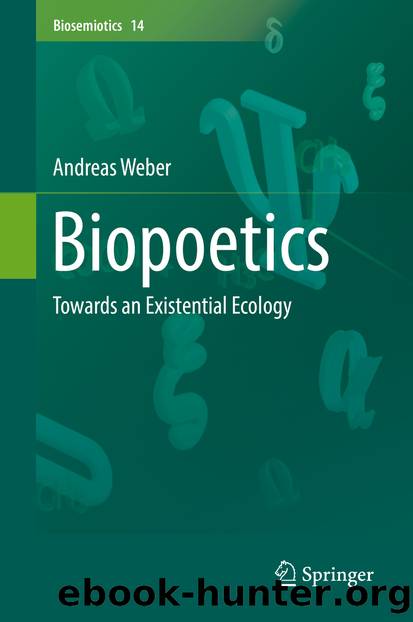Biopoetics by Andreas Weber

Author:Andreas Weber
Language: eng
Format: epub
Publisher: Springer Netherlands, Dordrecht
Language as a Nervous System
Systems which create novelty through the mutual specification of their participants, or the reciprocal transformation of their interior parts and the outside, can all be classified as nervous systems. Nervous systems transform everything they come into contact with through an active transformation of themselves. If we are entangled with reality in a commons of perception, reality as a whole can be classified as a neural system, an organ of perception and expressive transformation.
Through its potential of being a substance of transformation, the linguistic meshwork in itself can be compared to the nervous system of a living being. Language therefore is a sensory system existing outside of our bodies, which we can apply to get into connection with what there is through transforming it. The nervous system of language brings forth itself, but at the same time I am constructing it, it equally contains me and defines what I can perceive.
Seen from that perspective, any living gesture has features of language. And all language is in a deep sense “wild”, self-organising, and embodied. But when it becomes explicit, and explicitly used through its existing on a “different” level which hence is incompatible with the purely somatic realm, its metamorphic nature becomes all the more visible. Language is a means of transsubstantiation between bodies and symbolic fragments of core selves, and between different living bodies and different core selves. To make this transsubstantiation possible, lack is necessary. Lack in language is the detachment from matter, its seeming “abstractness”, which is in reality a level of symbolic inventiveness.
Its abstractness, its mere existence in “mind” is what makes language incomplete, and hence unites it with the organic realm. For a living organism, lack generates abundance. The ever fleeting matter, the other individual to which the self can never completely connect to, the desire for a future which is precarious, supply the incompleteness necessary to generate subjectivity. Language works through this kind of lack as well. It is incomplete because it does not use material contagion to convey meaning but symbolical suggestiveness, which is entirely characterized through the absence of what it is about, as the poetic example of abductive reasoning has shown.
Language therefore is nothing special to culture, and nothing the human could use as a moniker of his exceptionality. It works with incompletness in order to designate a connection, it creates meaning by imagining a void and a desire through an imaginative surplus. In this, it is no different from body. It does just the same. It is a portion of the living flesh of the creative reality and deeply unites us with it.
The ecology of language thus forms another level of the creative ecology of mind in which we are embedded, another layer of the whole which is self-fissioning, self-regulating, self-perceiving, self-contradicting and continuously creating newness through the transformations required for this perception. Language is wild as is a landscape, and as such it enables us to enlarge our experience of ourselves. For like the nervous system of
Download
This site does not store any files on its server. We only index and link to content provided by other sites. Please contact the content providers to delete copyright contents if any and email us, we'll remove relevant links or contents immediately.
Good by S. Walden(3541)
The Social Psychology of Inequality by Unknown(3011)
0041152001443424520 .pdf by Unknown(2840)
The Checklist Manifesto by Atul Gawande(2836)
Get What's Yours for Medicare: Maximize Your Coverage, Minimize Your Costs by Philip Moeller(2562)
The Meaning of the Library by unknow(2557)
Guns, Germs and Steel by Diamond Jared(2353)
Borders by unknow(2300)
23:27 by H. L. Roberts(2241)
And the Band Played On by Randy Shilts(2183)
Being Mortal: Medicine and What Matters in the End by Atul Gawande(2101)
A Leg to Stand On by Oliver Sacks(2026)
The Hot Zone by Richard Preston(2006)
More Than Words (Sweet Lady Kisses) by Helen West(1851)
The Valachi Papers by Peter Maas(1843)
The Laws of Medicine by Siddhartha Mukherjee(1788)
The Andromeda Strain by Michael Crichton(1738)
The Obesity Epidemic by Robyn Toomath(1662)
Get What's Yours for Medicare by Philip Moeller(1651)
